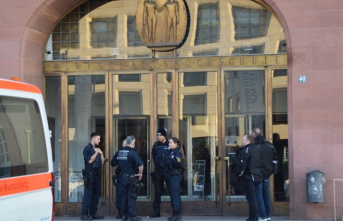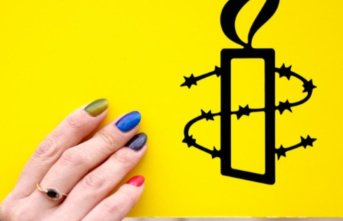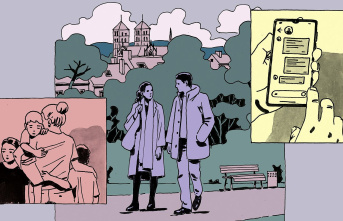Tougher penalties for terrorists, house arrest for terrorist offenders: The Council of States approved on Monday measures to combat terrorism at the second attempt. He follows the core points of the Federal Council, exacerbated but the degree of punishment.
The government has made to the Parliament two bills submitted. The a is intended to facilitate the prosecution of terrorist offences. The second bill provides for preventative measures. This is not to resort to a, if the notes for the opening of criminal proceedings, be sufficient. On the other, to enable the authorities to have someone released from prison still under control.
The call for new rules was to become, among other things, in connection with three Iraqis, according to the, which had to be released from prison and is still considered to be dangerous, were considered. The authorities could do nothing, because a statutory basis was lacking. The Federal Council responded with a package of measures against terrorism.
Little hearing for law Commission
The small chamber had rejected two of these templates in the winter session of the Security Commission (Sik). Order according to you sought after in the law Commission, a co-Rapporteur. This formulated a number of recommendations to police measures and legal assistance.
On Monday, the Council of States debated the Details of the two proposals, and followed to a great extent of its preparatory Committee. Just a few points of criticism, the law Commission found the entrance. In the overall vote, the transactions with 35 votes to 0 with 8 abstentions, respectively, 35 votes to 5 were approved with 2 abstentions. Now go to the national Council.
Jihad travel in focus
In the centre of the first template to create a new criminal provision, which provides Recruiting, training, and travel for terrorist purposes, under penalty.
the financing of actions included. Today, there are provisions in the temporary law. Now this should be on a permanent legal basis and a clear focus provided.
"We exceed the boundaries of the ethos of criminal law," warned councillor Mathias Zopfi (Green/GL) and requested to restrict the template to the Essentials. The enlisted are not to be punishable by law, said Minister of justice, Karin Keller-Sutter. First, if a Person is taking concrete steps to attack the law. The Council followed it up with 34 votes to 8 with one abstention.
No distinction between the Mafia and IS
In the case of the penalty amount goes to the Council of States more than the Federal Council. He argued that the sentence for both the assistance or involvement in criminal and terrorist organizations to up to ten years. The draft of the Federal Council, provides for different penalties of five and ten years.
From the point of view of the majority would lead to this distinction but in the interpretation of ambiguities, such as the Commission spokesman Daniel Jositsch (SP/ZH) has said. "Criminal organizations like the Mafia often resort to the same means such as terrorist groups," said Thierry Burkart (FDP/AG). A different treatment of the two terms therefore make no sense. The decision was taken with 30 votes to 13 with 2 abstentions.
Punishable by law, the mere participation in a criminal or terrorist organization, and their support is already available. The participation must be manifested by an act need not be criminal. Important is the intent, but it is still Jositsch said.
legal help under clear conditions
Further, the Council of States for the Confederation and the cantons creates the possibility of a cross-border investigation group. In addition, the Swiss authorities will be able to transmit, under certain conditions, information in advance to foreign authorities. Due to the rapid flow of information, serious crimes can be prevented. "If we want to combat Terror, then we must fight him here, but also abroad," said Commission spokesman Jositsch.
success had a single application of Beat Rieder (CVP/VS), according to which early Transmission of information and evidence in particular, in the case of terrorist offences should apply. Rieder argued that, without clarification of the legal assistance act on the head would be placed. He warned of a precedent for the exchange of other data.
offenders on the Radar
In the second template, delicate questions to debate are the rule of law. What to do if someone is classified as dangerous, but the evidence is not sufficient for a criminal case? Or if someone has served his punishment, but still as dangerous is?
As a terrorist threat are considered persons under the law, then, if, based on concrete and current evidence it must be assumed that they will be engaged in a terrorist activity.
Controversial house arrest
For the control of these people to get the police in the future, additional instruments. Is provided, for example, that offenders must regularly report to an authority, that the departure is denied or a rayon ban is imposed.
a house can be imposed for arrest, however, only with a judicial approval. Opponents of such a measure, spoke of a "coercive detention", the Convention on the rights of would not have with the European people compliant.
The Council of States decided, in accordance with the Federal Council - various exceptions when offenders are allowed to leave the house anyway: namely, for acquisition and training purposes, the exercise of freedom of belief or the perception of family obligations.
measures against children
in accordance with further decisions of the Council of States, the police are preventive measures, with the exception of house arrest for six months. You can only be extended once for a maximum of six months.
The house arrest should, if necessary, be able to two Times to a maximum of three months can be extended. The Council followed the Federal Council. His preliminary advice to the Commission had requested an extension of the measure, without limit.
The house arrest can be imposed against persons aged 15 or over, other measures can be left to the authorities already in children from 12 years. A minority, which failed for all measures, the minimum age of 18 provided. "We have to accept these children, otherwise, the bomb is ticking," said the Glarus Green Zopfi, however, found no majority. (aru/sda)
Created: 10.03.2020, 13:42 Uhr
Date Of Update: 10 March 2020, 16:04










